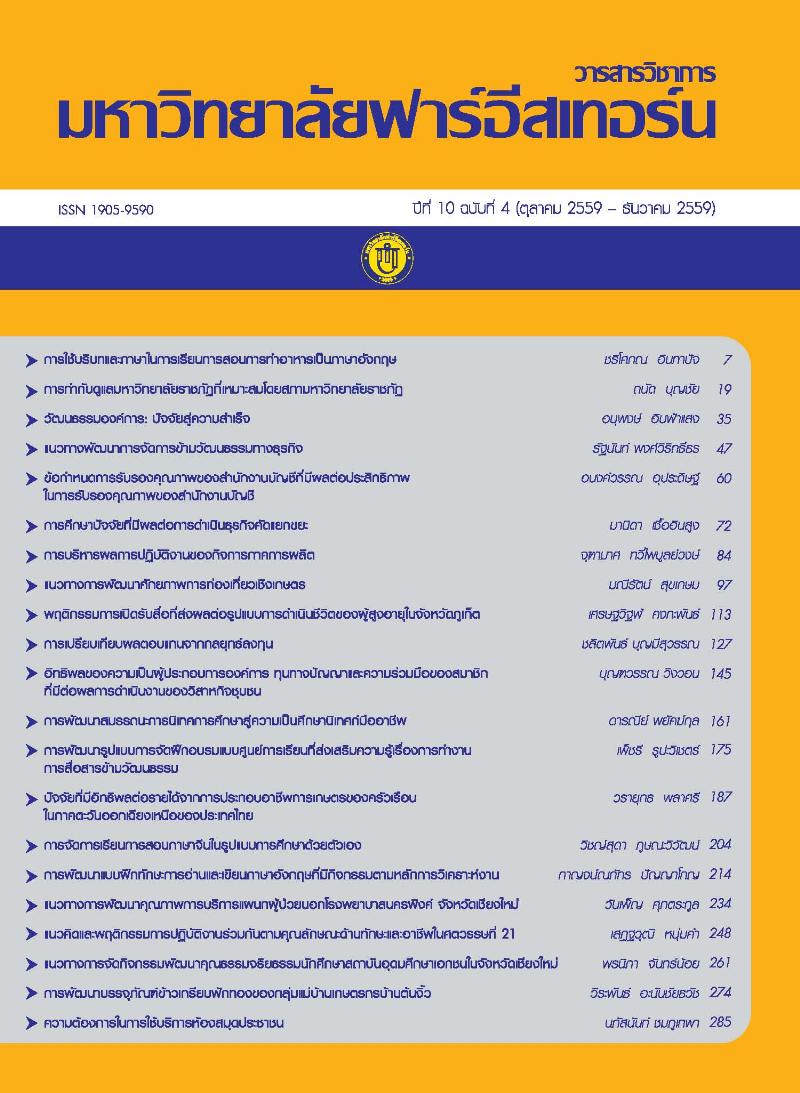การศึกษาปัจจัยที่มีผลต่อการดำเนินธุรกิจคัดแยกขยะในภาคเหนือตอนล่างของประเทศไทย
Main Article Content
Abstract
การวิจัยนี้มีวัตถุประสงค์ 1) ศึกษาลักษณะของกลุ่มธุรกิจ (กลุ่มธุรกิจครอบครัว กลุ่มแฟรนไชส์ และกลุ่มกิจการร่วมค้า) ที่มีต่อผลการดำเนินธุรกิจ 2) ศึกษาปัจจัยภาวะผู้นำ การขอรับการสนับสนุนจากภาครัฐ การสร้างเครือข่าย การพัฒนาเทคโนโลยีนวัตกรรม และความสามารถในการแข่งขันที่มีผลต่อการดำเนินธุรกิจ และ 3) ศึกษาแนวทางในการพัฒนาการดำเนินธุรกิจคัดแยกขยะในภาคเหนือตอนล่างของประเทศไทย
จากกลุ่มตัวอย่าง 217 คน ที่เป็นผู้ประกอบการในธุรกิจคัดแยกขยะ (SMEs) จาก 3 กลุ่ม ได้แก่ กลุ่มแฟรนไชส์ กลุ่มกิจการร่วมค้า และกลุ่มธุรกิจครอบครัว การวิจัยนี้เป็นการวิจัยเชิงสำรวจ เครื่องมือที่ใช้ในการวิจัย คือ แบบสอบถาม สถิติที่ใช้ ได้แก่ การแจกแจงความถี่ ค่าร้อยละ ค่าเฉลี่ยและค่าส่วนเบี่ยงเบนมาตรฐาน การวิเคราะห์ความแปรปรวนแบบทางเดียว (one way ANOVA) ผลการวิจัย พบว่า กลุ่มธุรกิจคัดแยกขยะใช้ปัจจัยภาวะผู้นำ การขอรับการสนับสนุนจากภาครัฐ การสร้างเครือข่าย การพัฒนาเทคโนโลยีนวัตกรรมและมีความสามารถในการแข่งขัน ปัจจัยที่มีผลต่อการดำเนินธุรกิจ คือ การพัฒนาเทคโนโลยีนวัตกรรม และแนวทางในการพัฒนาการดำเนินธุรกิจโดยให้ผู้ประกอบการธุรกิจคัดแยกขยะประยุกต์ใช้ภาวะผู้นำ พร้อมขอรับการสนับสนุนจากหน่วยงานราชการที่กำกับดูแลและหน่วยงานที่เกี่ยวข้อง ด้านความรู้ งบประมาณ ด้านการผลิตและด้านการตลาด และสร้างเครือข่ายเพื่อมาพัฒนาเทคโนโลยีนวัตกรรมที่เสริมสร้างศักยภาพทางการแข่งขัน ข้อจำกัดในการวิจัยครั้งนี้ จำกัดขอบเขตเป็นผู้ประกอบการในธุรกิจคัดแยกขยะ (SMEs) ในเขตภาคเหนือตอนล่างเท่านั้น ผู้วิจัยไม่ได้ศึกษาผู้มีส่วนได้ส่วนเสียอื่น เช่น ภาครัฐ ชุมชน ฯลฯ ดังนั้นจึงต้องตีความและนำข้อมูลไปใช้อย่างระมัดระวัง
This research aimed to 1) study waste recycling business group (family business group, franchise group and joint venture group) affecting on firm performance 2) study leadership factor, subsidized by the government policy, networking, technovation and competitiveness factor affecting on firm performance and 3) study the way to develop waste recycling business in the Lower Northern Thailand by one way ANOVA test. This study focused on the waste recycling business (SMEs) 217 samples of 3 groups; Franchise group, Joint Venture group, and Family Business group. This research was the survey research, the data were collected in term of questionnaire. The statistic used in the research were the descriptive statistic analysis such as frequency, percentage, arithmetic mean and standard deviation. The research results showed that waste recycling business group had leadership, subsidized by the government policy, networking, technovation and competitiveness factor. Factors affecting on firm performance of waste recycling business in the Lower Northern Thailand were technovation and the way to develop their performance by applied leadership, subsidized from government service policy. The relationship of the network should be used and developed their technovation and competitiveness that run through business.
Article Details
1. Any views and comments in the Journal of Social Innovation and Lifelong Learning are the authors’ views. The editorial staff have not to agree with those views and it is not considered as the editorial’s responsibility.
2. The responsibility of content and draft check of each article belongs to each author. In case, there is any lawsuit about copyright infringement. It is considered as the authors’ sole responsibility.
3. The article copyright belonging to the authors and The Far Eastern University are copyrighted legally. Republication must be received direct permission from the authors and The Far Eastern University in written form.
References
กรมควบคุมมลพิษ. (2555). ปริมาณขยะชุมชนของประเทศไทยในรอบ 10 ปี. สืบค้นเมื่อ 14 ธันวาคม 2555 จาก http://www.pcd.go.th/info_serv/waste_garbage.html#s1
กรมโรงงานอุตสาหกรรม. (2555). การพัฒนาระบบการจัดการสิ่งแวดล้อมเพื่อเพิ่มผลผลิตและรักษาคุณภาพสิ่งแวดล้อมโรงงาน สืบค้นเมื่อ 14 ธันวาคม 2555 จาก http://www.diw.go.th/advagrp/ems.html
ศริศักดิ์ สุนทรไชย และวรรณวดี พูลพอกสิน. (2548). การส่งเสริมสุขภาพอนามัยและสภาวะแวดล้อมของแรงงานคุ้ยขยะและแรงงานที่เกี่ยวข้อง. สำนักงานกองทุนสนับสนุนการสร้างเสริมสุขภาพ. กรุงเทพฯ
สถาบันวิจัยเพื่อการพัฒนาประเทศไทย. (2551). การคุ้มครองสิ่งแวดล้อม: จากหลักการผู้ก่อมลพิษเป็นผู้จ่าย (Polluters Pay Principle) ถึงกระบวนการมีส่วนร่วมของประชาชน (People’s Participation Policy). รายงานทีดีอาร์ไอ ฉบับที่ 59 เดือนมิถุนายน 2551.
สมจิตร ลิขิตสถาพร. (2554). ปัญหาอันดับหนึ่งในธุรกิจแฟรนไชส์. กรุงเทพธุรกิจบิสวีค หน้า 5 วันที่ 11 เมษายน 2554
สำนักงานส่งเสริมวิสาหกิจขนาดกลางและขนาดย่อม (สสว.). (2549). นวัตกรรมเพื่อสร้างมูลค่าและความยั่งยืนของ SMEs. พิมพ์ครั้งที่ 1 กรุงเทพฯ
สุนีย์ มัลลิกะมาลย์ สมชาย รัตนโกมุท อิทธิพล ศรีเสาวลักษณ์ สิรินทรเทพ เต้าประยูร นฤมล วิเธอร์ ฮาร์วีย์ ศศิธร พุทธวงษ์ สุจินดา โกวิทยานนท์...และเสถียร รุจิรวนิช. (2543). การจัดการขยะชุมชนอย่างมีประสิทธิภาพ : รูปแบบและมาตรการทางสังคม เศรษฐศาสตร์ การจัดการ และกฎหมายเพื่อแก้ไขปัญหาขยะชุมชน. สำนักงานกองทุนสนับสนุนการวิจัย.
สุวิมล ติรกานันท์.(2549). ระเบียบวิธีการวิจัยทางสังคมศาสตร์ : แนวทางสู่การปฏิบัติ. ภาควิชาการประเมินและการวิจัย คณะศึกษาศาสตร์ มหาวิทยาลัยรามคำแหง. สำนักพิมพ์จุฬาลงกรณ์มหาวิทยาลัย.
Arrandale, T. (1994). A guide to recycling. Governing 7, 59-60.
Boyer, K.K., and Lewis, M. (2002). Competitive priorities: Investigating the need for tradeoffs in operation strategy. Production and Operation Management, 11(1), 9-20.
Choe, Chongwoo and Iain Fraser. (2001). The Economics of household waste management : a review. The Austrian Journal of Agricultural Resources Economics, 42(3), 269-302.
Chung, S.A., and Poon, C.S. (1994). Hong Kong citizen’s attitude towards waste recycling and waste minimization measure. Resources Conversation and Recycling, 10, 377-400.
Drucker, Peter F. (2002). The Discipline of Innovation. The Innovative Enterprise. August 2002. Harvard Business School Publishing.
Evans, G. Edward and Patricia Layzell Ward. (2007). Leadership Basic for Librarians and information Professionals. The Scarecrow Press, Inc.
Gunasekaran, A., Okko, P., Martikainen, T. and Yli-olli, P. (1996). Improving productivity and quality in small and medium enterprises: Cases and analysis. International Small Business Journal, 15(1), 59-72. (AB1 02662426)
Hair, J. F., Anderson, R.E., Tatham, R.L. & Black, W.C. (1998). Multivariate data analysis. (5th ed.) New Jersey: Prentice-Hall.
Krejcie, R.V., and Morgan, D.W. (1970). “Determining Sample Size for Research Activities” Education and Psychological Measurement, 607-610.
Kotler, Philip. (2000). Marketing Management. 10th edition. New Jersey: Prentice Hall Inc.
Lavoie Jacques and Guerin Serge. (2001). Evaluation of Health and safety risks in municipal solid waste recycling plants. Journal of the Air & Waste Management Association. Vol, 51, 352-360.
McEvily, S. K., K.M. Eisenlardt, and J.E. Prescoft. (2004). The global acquisition, leverage, and protection of technological competencies. Strategic Management Journal. Vol. 25, 713-722.
Mullins, J. W., Walker, O. C. Jr., & Boyd, H. W., Jr. (2007). Marketing management: A strategic decision-making approach. New York: McGraw-Hill.
O’Gorman, C., and McTierman, L. (2000). Factor influencing the internationalization choices of small and medium-sized enterprises: the case of the Irish hotel industry. Enterprise & Innovation Management Studies, 1(1), 141-151.
Porter, M.E. (1985). Competitive Advantage: Creation and suspension performance. New York: Free Press.
Renbi, B. and Mardina, S. (2002). The practice and challenges of solid waste management in Singapore. Waste Management. August 22, 557-567
Seldman, Neil. (2004). Creating A Zero Waste Future in Europe. Bio Cycle, August 2004. Vol. 45(8), 66-70.
Tambunan, T. (2008). SME development, economic growth and government intervention in a developing country: The Indonesian story. Journal of International Entrepreneurship. Dordrecht. 6(4), 147-167.
Thangtongtawi, P. (2008). E-Waste management and illegal traffic in Thailand and South East Asia countries. Paper presented in IMPEL/TFS-conference. April 23-25, Sofia, Bulgaria.
Wolff, J.A., and Pett, T.L. (2000). Internationalization of small firms: An examination of export competitive patterns, firm size, and export performance. Journal of Small Business Management, 36 (2), 34-47.
Xu, Z., Lin, J., & Lin, D. (2008). Networking and innovation in SMEs: Evidence from Guangdong province, China. Journal of Small Business and Enterprise Development, 15(4), 788-801.

